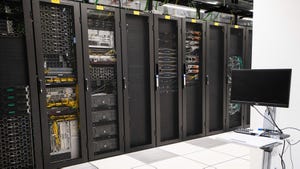
Insight and analysis on the data center space from industry thought leaders.
24/7 Guardians: A Day in the Life of a Modern Data Center Team24/7 Guardians: A Day in the Life of a Modern Data Center Team
Modern data center teams are unsung heroes ensuring seamless digital experiences. Praveen Jain delves into how they overcome challenges and shape our connected future.

Imagine a financial exchange experiences latency issues during peak market hours, potentially affecting millions, if not billions, of dollars in transactions. In another part of the world, a doctor in the middle of heart surgery is notified his connection is unstable, potentially impacting the procedure. Meanwhile, in another region, a logistics system has gone down, disrupting supply chain and trade for at least a week.
These aren’t hypothetical scenarios – they’re the daily reality faced by a specific group of professionals who enable our network infrastructure. These are the data center specialists, the architects of our seamless digital experiences who work behind the scenes to keep our connected world running smoothly.
The Modern Data Center Challenge
For larger organizations, from financial and healthcare services to manufacturing operations and retail systems, data center specialists shoulder the responsibility of maintaining critical infrastructure that, when faced with an outage, can result in losses exceeding $5 million per hour.
The above scenarios – whether preventing outages or troubleshooting to mitigate the impact of disruptions – are where today’s professionals truly shine. They face an evolving landscape where traditional networking expertise must seamlessly blend with cutting-edge AI and cloud technologies. They’re not just managing servers and switches; they’re orchestrating complex ecosystems where, today, AI workloads exhibit distinct traffic flows and demand specialized GPU optimization.
What truly sets these teams apart isn’t just their commitment to excellence and innovation – it’s their extraordinary technical prowess. These professionals are continuously adapting to new challenges and pushing the boundaries of what's possible. They maintain meticulous data organization practices to support AI/ML tools, embrace continuous learning to stay ahead of technological evolution, and foster strong team collaboration that drives business success.
A Day in the Life of a Modern Data Center Team
For many IT professionals, a traditional 9 to 5 doesn’t exist. A typical morning might begin well before dawn, with proactive system health checks – which used to take hours to manually conduct, but today are made more efficient by leveraging AI-powered diagnostic tools. These help teams by autonomously spotting potential issues before they impact services, enabling professionals to focus their time on more creative tasks.
As the day progresses, these professionals navigate through different aspects of a sophisticated framework that we’ll call the Data Center Lifecycle:
Day 0 Planning: Architecting robust systems requires meticulous attention to detail as well as systems thinking. These professionals design network topologies, establish testing procedures, and create blueprints for scalable infrastructure. A key tool here is the use of digital twins – virtual replicas of the production network that allow for comprehensive simulation and optimization. By employing digital twins, architects can explore “what if?” scenarios, testing changes, capacity expansions or AI workload integrations without risking the stability of the live environment. This approach ensures the foundation is not only robust but also adaptable to support tomorrow's innovations.
Day 1 Implementation: The deployment phase demands surgical precision. Teams work methodically to bring designed networks to life, connecting switches, implementing configurations, and conducting rigorous testing protocols. Every connection must be verified, every configuration validated, and every system tested and balanced under load to ensure flawless operation before going live.
Day 2+ Operations: This is where the true art of data center management shines. Teams maintain optimal performance through continuous monitoring, rapid response to anomalies, and proactive optimization. They leverage automation for routine tasks while focusing their expertise on strategic improvements and innovative solutions to emerging challenges and new business requirements.
When anomalies occur, these professionals follow a methodical approach: assess user impact, identify root causes, and deploy appropriate responses – all while maintaining clear communication channels across the organization.
Here is a real example: When a major e-commerce platform experiences a surge in holiday shopping traffic, these teams don’t just wait for phone calls from angry business leaders or for alarms to sound. Rather, they have already anticipated and prepared for the bandwidth challenges, identified the network links that may affect application performance, and enacted appropriate configurations. Their proactive approach, powered by AI-driven insights and years of expertise, ensures that millions of transactions process smoothly, even during peak loads.
Shaping Tomorrow’s Digital Landscape
As we push the boundaries of what’s possible with technology, the role of data center professionals becomes increasingly crucial.
Modern data center teams are becoming steadily more equipped with AI-powered tools that serve as force multipliers for their expertise. These sophisticated solutions have transformed how teams approach their daily responsibilities with:
Real-time diagnostics and troubleshooting: AI systems can continuously analyze network traffic patterns, application performance metrics, and infrastructure health indicators. They can identify potential issues within milliseconds, often before they impact user experience.
Predictive analytics: Advanced algorithms process historical data and current trends to forecast potential system bottlenecks, capacity constraints, or hardware failures. This enables teams to perform preventive maintenance and capacity planning with unprecedented accuracy.
Proactive problem mitigation: When potential issues are detected, AI systems can automatically implement corrective measures or provide detailed remediation recommendations to the team. This might include rerouting traffic, adjusting resource allocation, or initiating failover procedures.
AI tools won’t replace the expertise of data center professionals; they empower them to operate at an even higher level. These are the professionals who ensure AI is implemented effectively, who interpret its insights, and who step in when human intuition is needed to solve complex challenges.
These data center teams aren’t just maintaining infrastructure; they're architecting the future of network experiences, supporting transformative innovations, and ensuring the reliability of services that power our modern world. Their diligence drives the adoption of cutting-edge technologies while maintaining the robust foundation that is critical to society.
Read more of the latest data center operations and management news
The next time you seamlessly join a video call, complete an online purchase, or access critical cloud services, remember that there’s a dedicated team of professionals working tirelessly behind the scenes to make it all possible. They are the true guardians of our digital future, and their expertise, dedication, and unwavering commitment keep our connected world running smoothly, one millisecond at a time.
This article is a part of “The Essential Tech Worker” series by Juniper Networks, bringing to life the importance of IT professionals and raising awareness of their growing impact within organizations, providing insights into their day-to-day work.
About the Authors
You May Also Like











